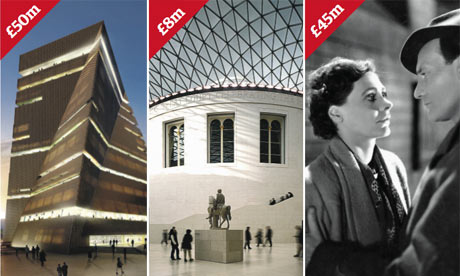
Funding of some of the most prestigious cultural grand projects in Britain is in jeopardy because a £100m black hole has been discovered in the budgets of the Department for Culture, Media and Sport, Whitehall sources disclosed tonight.
The scale of the department's spending over-commitment could derail ambitious building projects such as the British Museum's new exhibition wing, Tate Modern's redevelopment, the British Film Institute's film centre on the South Bank in London and the Stonehenge visitor centre.
The shortfall has emerged in the capital budget for the financial years 2009-10 and 2010-11. Senior arts sources today variously called the funding crisis "a cock-up" and "quite astonishing". One source said: "It's hopeless management. Everyone will blame the DCMS for being hopeless, and they are fairly hopeless, so it's not unjustified."
According to another source: "Financial directors of interested bodies received a letter saying they were £100m overspent on capital and seeking contributions from unspent capital money."
The DCMS refused to comment on why it had got into a situation in which it had overpromised funds for capital projects by approximately £100m. However, it is understood that the problem was noted several weeks ago and is being addressed by ministers. A DCMS spokesperson said: "Our capital budget is currently overcommitted. Ministers are examining the reasons for this and looking for solutions. It is possible that difficult decisions will be needed, but none has been taken yet."
A senior arts source said: "They will solve it by scrabbling around, and delaying things here and there. But my goodness, it's no way to run a railroad."
However, if critical funding was held up to get the DCMS out of financial trouble, major projects may be mothballed.
Tate Modern's redevelopment, designed by the Swiss architects Herzog and de Meuron, would increase the size of the gallery by 60%. A £50m one-off grant from the government towards the £215m budget was announced by the then culture secretary, James Purnell, in 2007.
At the time, he said the grant would "act as a firm symbol of the government's commitment to this amazing project".
The plan had been to open the new building – which the Tate has described as the most important new building for culture in Britain since the British Library in 1998 and the Barbican in 1982 – in time for the London Olympics in 2012. Approximately a third of the required funding is in place, but the £50m from the government is now, like all capital projects, under review because of the DCMS's problems. The government funding forms the bedrock on which private funds can be raised – itself an increasingly difficult task in the current economic climate.
The British Museum's £135m north-western development, to which the government pledged £22.5m in 2007, would give it a 1,500 sq metre exhibitions space to replace the current temporary arrangement in the museum's reading room. Today the project is due to receive a decision on planning consent. Niall FitzGerald, the British Museum chairman, said last week it would be a "catastrophe" if the museum failed to create a new exhibitions space. A spokeswoman for the museum said today that the DCMS overcommitment "doesn't really apply to us. We secured our money in 2007 – and have only £8m outstanding." But the urgent DCMS review is understood to encompass all capital projects, including those, such as the British Museum's, to which the government has already made firm cash pledges.
In the longer term, the DCMS overcommitment could also affect plans to establish a base for the Royal Opera House in Manchester.
Stonehenge is due to get a £25m new visitor centre in time for the Olympics, partly funded by the DCMS, and the British Film Institute has £45m earmarked. That would go towards building a £166m film centre on the South Bank, aiming for completion in 2016, and replacing the current BFI buildings in London.
"The building we are in is no longer fit for purpose," said a BFI spokesman. "It probably has about eight more years' life in it. Beyond that we would be looking at no more cinemas, no more mediatheques, no more bars and restaurants ... it has come to the end of its life and we cannot sustain ourselves on that site." He called the situation with the BFI's properties on the South Bank and elsewhere in London a "burning platform".
The film centre, he said, would be "about giving film – the language and medium of choice for the 21st century – a proper home, helping Britain retain its competitive edge and providing a centre for the film industry". He said the project was currently "being batted back and forth between the Treasury and DCMS. Everyone thinks it's a great idea – but someone somewhere needs to press the button."

